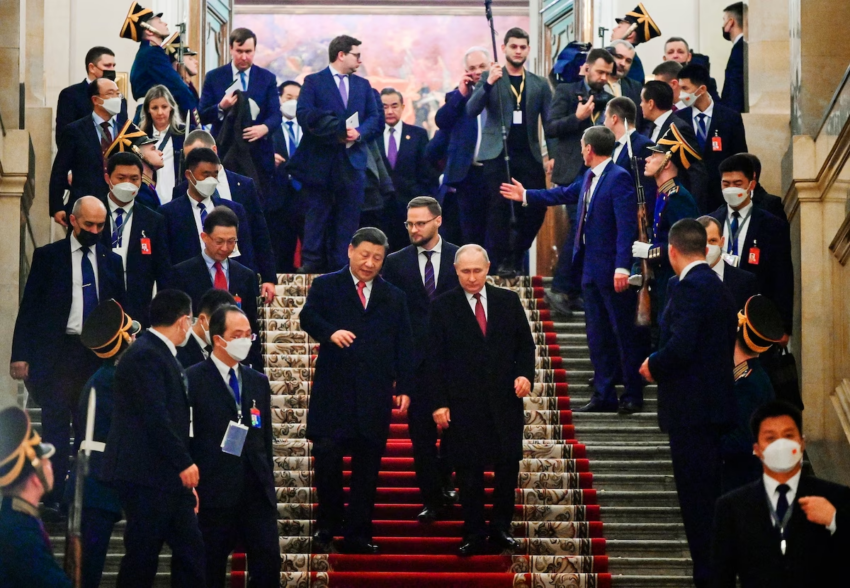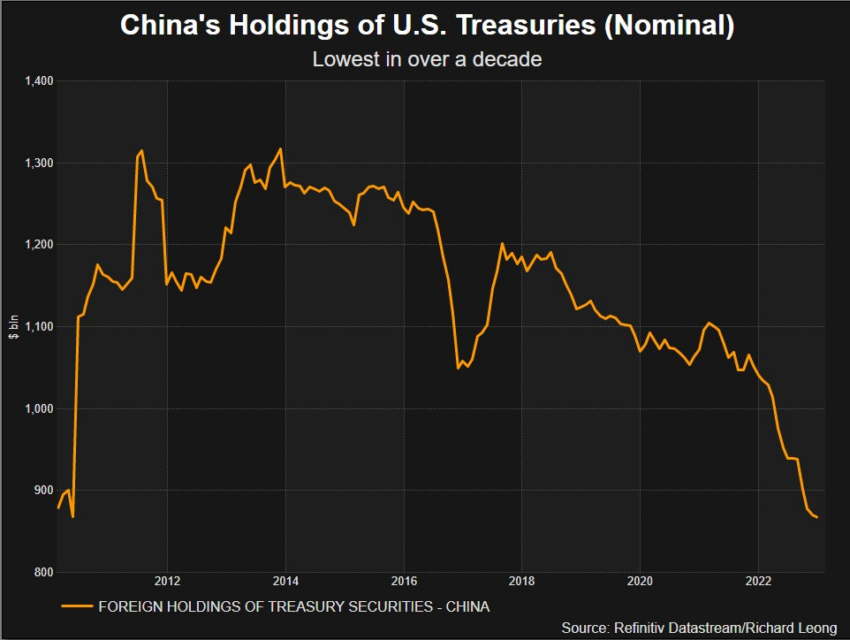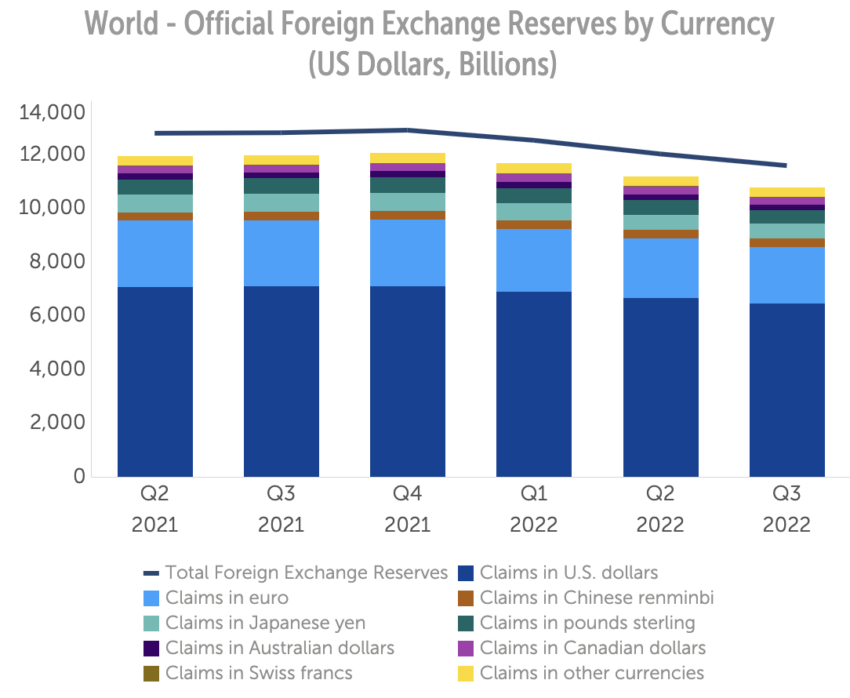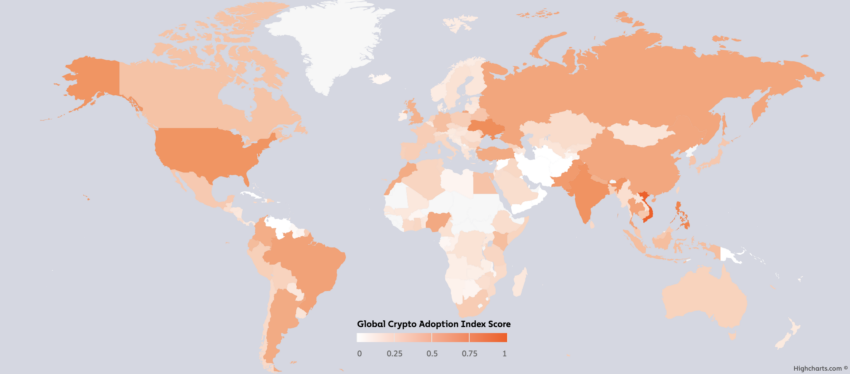As the war in Ukraine rages on and the United States adopts an aggressive approach to China and Bitcoin, the two countries are actively attempting to erode the US dollar’s status as the anchor of the international financial system.
The US dollar remains America’s last superpower, granting it unparalleled economic and political clout. Still, Russia and China’s efforts to diversify away from it have significant implications.
The Decline of US Dollar Dominance
During the recent summit between Vladimir Putin and Xi Jinping, the Russian president supported using the Chinese yuan for settlements between Russia and countries in Asia, Africa, and Latin America. Central banks worldwide hold fewer US dollars in reserve, and trade between Russia and China is increasingly settled in yuan.
The coalition of advanced economies formed by the Biden administration in its economic battle against Russia creates challenges for countries seeking to move away from the US dollar and adopt other stable currencies, such as the euro or pound.

The European Union’s efforts to enhance the euro’s international role, spurred by Trump’s 2018 withdrawal from the Iran nuclear deal, have yet to bear fruit due to lingering doubts about the euro’s future.
China’s attempts to expand the yuan’s role internationally have also faced roadblocks. The currency’s value is still influenced by government whims rather than market forces. Liberalizing China’s financial sector could make the yuan a true US dollar competitor. But this would require a shift toward market-oriented policies that contradict Xi Jinping’s domestic goals.

Exploring Alternatives: International Payment Systems
Despite the US dollar’s entrenched dominance, its share in global central bank reserves has dropped from around 70% two decades ago to below 60% today, with the decline continuing.
Countries are increasingly exploring alternatives. Europe and China are working on international payment systems outside the US dollar-dominated SWIFT. Saudi Arabia is considering pricing its oil in yuan. And India is settling most of its oil purchases from Russia in non-dollar currencies. Meanwhile, digital currencies like China’s central bank digital currency may offer another avenue.
Though the US dollar is unlikely to be replaced by a single alternative, it may experience a slow decline due to these numerous alternatives.

Author and investor Ruchir Sharma notes that for the first time in memory, the US dollar has been weakening, rather than strengthening, during an international financial crisis. Should the US dollar’s unique status fade, the US will face an unprecedented reckoning.
Its politicians have grown accustomed to spending without concern for deficits and relying on the Federal Reserve’s balance sheet expansion.
The Role of Bitcoin in a Multipolar Currency World
With countries like Russia and China attempting to undermine the US dollar’s dominance, the evolving global financial landscape presents an opportunity for cryptos like Bitcoin to play an increasingly significant role.
As the world moves toward a multipolar currency environment, Bitcoin’s decentralized and borderless nature could offer attractive alternatives to nations seeking to reduce their dependence on the US dollar.
Bitcoin’s potential impact on the international financial system lies in its ability to facilitate transactions without relying on central authorities. This makes it particularly appealing for nations seeking to bypass traditional financial channels and maintain their economic sovereignty. Additionally, Bitcoin’s transparent and decentralized ledger can provide a level of trust and security that may be lacking in government-controlled currencies.
In recent years, countries facing economic sanctions or currency crises have turned to Bitcoin. They have been able to circumvent restrictions and preserve their purchasing power.
For instance, during the recent protests in Nigeria, when the government attempted to block access to funds, Bitcoin provided an alternative means of support. In Venezuela, amidst hyperinflation, people have turned to Bitcoin as a store of value.

The growing adoption of Bitcoin, driven by technological advancements like the Lightning Network, could further enable seamless cross-border transactions and reduce reliance on traditional banking infrastructure. This would empower millions of people who currently lack access to financial services. Particularly, in regions like Africa, where a significant portion of the population remains unbanked.
However, it is important to acknowledge the challenges associated with Bitcoin’s adoption as a mainstream currency.
Factors like price volatility, scalability, and energy consumption remain obstacles to overcome. Additionally, regulatory frameworks must adapt to accommodate the use of crypto. They must also address money laundering, tax evasion, and investor protection concerns.
The US must prepare for this shift toward a multipolar currency environment. Countries are already exploring various alternatives to protect themselves from becoming the next Russia. Failing to adapt to these changes could leave the US facing the consequences of economic complacency.
In adherence to the Trust Project guidelines, BeInCrypto is committed to unbiased, transparent reporting. This news article aims to provide accurate, timely information. However, readers are advised to verify facts independently and consult with a professional before making any decisions based on this content.
This article was initially compiled by an advanced AI, engineered to extract, analyze, and organize information from a broad array of sources. It operates devoid of personal beliefs, emotions, or biases, providing data-centric content. To ensure its relevance, accuracy, and adherence to BeInCrypto’s editorial standards, a human editor meticulously reviewed, edited, and approved the article for publication.

